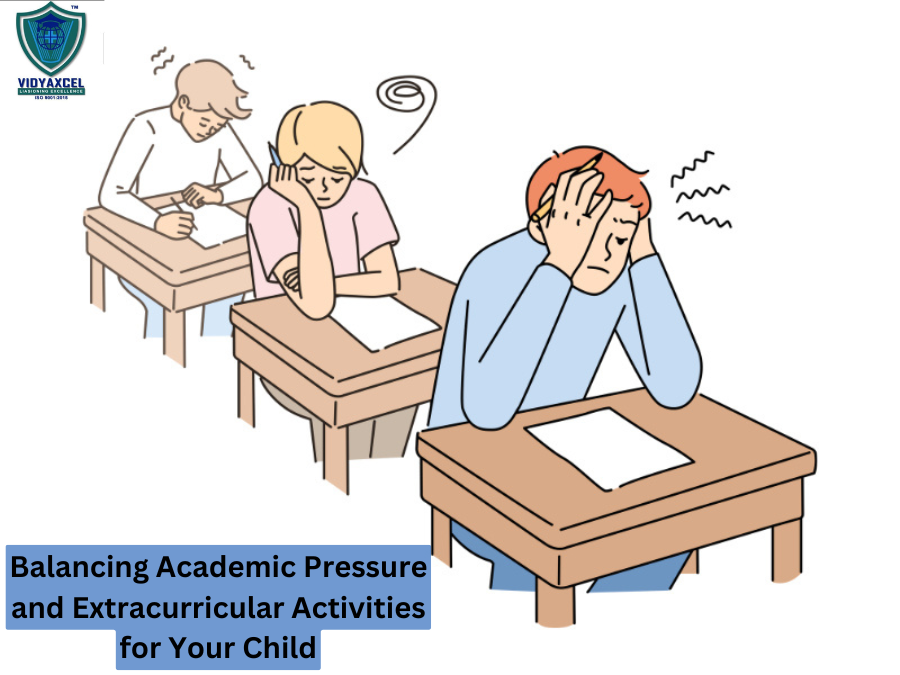Blog Details

19Nov
Balancing Academic Pressure and Extracurricular Activities for Your Child
In today’s competitive world, children face immense academic expectations alongside the growing need to participate in extracurricular activities. While academics lay the foundation for future success, extracurriculars are equally important for fostering creativity, building social skills, and developing resilience. However, managing both can often feel like walking a tightrope for children and parents alike.
Striking the right balance is essential to ensure your child excels academically while also benefiting from the holistic development that extracurricular activities provide. This article explores practical strategies to help parents support their children in managing both aspects effectively, ensuring a well-rounded and fulfilling childhood experience. Here’s a guide to help parents support their children in managing academic responsibilities and extracurricular commitments effectively.
1. Understand the Benefits of Balance
- Academic Excellence: Focused academics lay the foundation for future career opportunities.
- Skill Development: Extracurriculars build essential life skills like teamwork, leadership, and time management.
- Mental Health and Well-Being: A balanced schedule reduces stress and fosters a sense of accomplishment in multiple areas.
By understanding the importance of both, you can help your child find a balance that works for them.
2. Prioritize Time Management
- Create a Schedule: Work with your child to plan their daily or weekly activities. Allocate specific times for studying, extracurriculars, and relaxation.
- Use Tools: Encourage them to use calendars, apps, or planners to stay organized and track deadlines or event dates.
- Set Realistic Goals: Ensure that the goals for both academics and extracurriculars are achievable without overwhelming them.
3. Recognize Their Limits
- Avoid Overloading: Too many activities can lead to burnout. Help your child focus on a few key interests rather than spreading themselves too thin.
- Watch for Stress Signs: Be alert to signs of fatigue, irritability, or declining academic performance, which could indicate they are overcommitted.
4. Foster Open Communication
- Discuss Their Interests: Understand your child’s passions and let them choose activities they genuinely enjoy.
- Encourage Feedback: Create an environment where they feel comfortable sharing if they feel overwhelmed or need adjustments in their schedule.
5. Promote Quality Over Quantity
- Focus on Depth: Encourage meaningful involvement in a few activities instead of superficial participation in many.
- Celebrate Achievements: Recognize their efforts in both academics and extracurriculars, emphasizing the importance of balance.
6. Lead by Example
- Model Balance: Show your child how you balance work, hobbies, and relaxation in your life.
- Practice Self-Care: Demonstrate the importance of taking breaks and prioritizing mental health
7. Teach Stress Management Techniques
- Mindfulness Practices: Activities like yoga or meditation can help your child manage stress effectively.
- Encourage Breaks: Teach them to take short breaks between study sessions to recharge and refocus.
- Positive Reinforcement: Remind them that it’s okay to make mistakes and that setbacks are part of learning.
8. Seek Support When Needed
If your child struggles to balance academics and extracurriculars despite your efforts:
- Talk to Teachers or Coaches: Collaborate with educators and activity leaders to adjust expectations or provide additional support.
- Consult a Counselor: Professional guidance can help your child manage stress and find a sustainable balance.
Conclusion
Achieving a balance between academics and extracurricular activities is essential for your child’s overall growth and well-being. By prioritizing time management, understanding their limits, and fostering open communication, parents can help children excel in their studies while also reaping the benefits of extracurricular involvement. This balance not only helps children develop critical life skills like resilience, teamwork, and time management but also ensures they maintain good mental health and enjoy their childhood. With your support and guidance, they can navigate their responsibilities confidently and thrive in both academics and their passions.
FAQ’s
Why is it important to balance academics and extracurricular activities?
Balancing academics and extracurricular activities ensures your child’s holistic development. While academics lay the foundation for intellectual growth and future career opportunities, extracurriculars help build essential life skills like teamwork, leadership, and time management. This balance also supports mental well-being by reducing stress and fostering creativity.
How many extracurricular activities should my child participate in?
The ideal number of extracurricular activities depends on your child’s interests, energy levels, and academic workload. Generally, focusing on one or two activities that they are passionate about is more beneficial than participating in multiple activities that might overwhelm them.
Can extracurricular activities benefit academic performance?
Yes, extracurricular activities can boost academic performance. They enhance critical skills like time management, problem-solving, and focus. Activities such as sports, music, and debate also promote discipline and cognitive development, which can positively impact learning.
Should I limit screen time if my child is struggling to balance academics and extracurricular?
Yes, excessive screen time can interfere with productivity and focus. Set reasonable limits on recreational screen usage, encouraging your child to prioritize academics and extracurricular commitments.
What role does relaxation play in balancing academics and extracurriculars?
Relaxation is vital for mental and physical health. Ensure your child has downtime to unwind, play, and socialize, as this prevents burnout and enhances overall productivity.
Our Office: West Bengal, Maharashtra & Delhi.
For More Infomation about admission in Medical, Engineering, Management & Study in Overseas Details.
View Current Study Overseas, Medical, Engineering & Management Admission Details Video.





